With that, I will step aside and let others speak...
==============================================================================================
Grammy Debacle Timeline
1990′s: Latin Jazz and other diverse ethnic categories are established in the Grammy Awards. Membership multiplies to 28,000
1990′s – to present – Small independent record companies (mostly begun by artists themselves) steadily begin to demonstrate their presence as nominees and winners of Grammys culminating with Multi-Cultural jazz musician Esperanza Spalding’s win for Best New Artist over teenage pop sensation Justin Bieber.
2001: Progressive Jazz Rock group Steely Dan wins Record of the Year Grammy over Eminem. Hip Hop. Pop music industry/community is in shock
2008 – Jazz legend Herbie Hancock wins Record of the Year Grammy over Kanye West. West’s and his management are incensed. Hip Hop, Pop music industry/community again in shock. NARAS begins secret meetings in earnest after the telecast to explore the possibility of downsizing the Grammy Awards because they have become “devalued” because according to current President Neil Portnow, “The Grammys have become a huge collage.” President Portnow’s own words at NYC Chapter Emergency Meeting, Monday April 11, 2011 – 6pm at New York Institute of Technology Auditorium 61st St. & Broadway, NYC.
February 13, 2011 – Indie record labels are nominated and win more Grammys than at anytime in the history of the Grammy Awards. Multi-Cultural jazz artist Esperanza Spalding wins Best New Artist Grammy over teenage Pop sensation Justin Bieber. It is the first time a musician wins over an entertainer. Pop music industry and the World in general are in a state of shock.
February 20: Immediately after the 2011 Grammy telecast Stephen Stoute, an industry insider and employee of Jay Z takes out a FULL one page ad in the New York Times blasting NARAS stating that they are out of touch with current popular society
and must be RESTRUCTURED. He insults Esperanza Spalding and the Grammy membership. It was the membership who gave her the win for her incredible musicianship. THE FIRST TIME A MUSICIAN IS CHOSEN OVER AN ENTERTAINER IN THIS CATEGORY. NARAS DOES NOT offer a rebuttal to defend the Academy and/or its members.
Justin Bieber fans begin an anti-Esperanza Spalding campaign that goes viral globally insulting her and Academy thus insulting the membership. Again, no response from the Academy.
Legendary Hip Hop and R&B Producer Jimmy Jam (Jimmy Jam and Terry Lewis) who is second in command to President Neil Portnow approves ALL category cuts in secret meetings with Grammy Board of Trustee members led by Leslie Anne Jones.
Black Wednesday – April 6, 2011 - NARAS sends out a mass e-mail to its membership stating to follow a link for a major announcement regarding the Grammys. The announcement states that a RESTRUCTURING (DOWNSIZING) OF THE GRAMYS HAS BEEN DECIDED UPON. The original 108 categories are now cut by 31. Some categories are CONSOLIDATED into unrelated categories thus giving no chance for independent record companies to compete. For example: Latin Jazz and Contemporary Jazz (two completely different styles) are now consolidated into JUST Best Jazz Recording and Best Large Jazz Ensemble, thus giving Latin Jazz artists virtually no chance to compete for a Grammy. Other categories like Hawaiian Polka, Zydeco, Cajun, etc. and as a final insult, Native American, are cut. MOST OF THE CUT CATEGORIES ARE ETHNIC CATEGORIES. THE DECISON BY NARAS IS MADE IN SECRET WITHOUT CONSULTING ANY OF ITS MEMBERSHIP OR CITY CHAPTER BOARD OF GOVERNORS.
Music community, particularly Latin Jazz and Jazz community are in shock. Realizing there will be flak, NARAS decides on a 13 city damage control/emergency tour to all major NARAS Chapter cities to explain how the NEW RESTRUCTURING gives PARITY to all artists and that no one is shut out from competing.
APRIL 11, 2011 - NARAS A FEW DAYS EARLIER sends out a mass e-mail inviting its NYC membership to come to the first meeting on Monday April 11 at 6pm at the New York Institute of Technology auditorium located at 1871 Broadway at 61rst. The e-mail specifically states that NON-MEMBERS are invited as well. THERE IS ABSOLUTLEY NO ANNOUNCEMENT IN THE E-MAIL THAT AN RSVP IS REQUIRED.
Members and non-members show up as do Larry Rother of the NY Times, Monika Fabian of the Daily News, and Larry Blumenthal of The Wall St, Journal and the Village Voice who were contacted the night before, (Daily News contacted the day of) by yours truly.
WE ARE ALL TOLD THAT IF WE DIDN’T RSVP WE CAN’T GET IN. EDDIE PALMIERI 9-TIME GRAMMY WINNER AND FORMER BOARD OF GOVENOR MEMBER AND THE PERSON WHO FOUGHT FOR 17 YEARS TO GET LATIN JAZZ RECOGNIZED BY NARAS AS WELL AS LARRY HARLOW, LARAS LIFETIME ACHIEVEMENT AWARD WINNER AND 3-TIME GRAMMY NOMINEE AND THE PERSON RESPONSIBLE FOR GETTING SALSA RECOGNIZED AS A GRAMMY
CATEGORY TOLD TO WAIT OUTSIDE, THAT THEY/WE CAN’T GET IN UNLESS THEY/WE RSVP’D. BOB SANCHO SHOWS PRINT OUT OF E-MAIL INVITE TO NARAS REPRESENTATIVE PROVING THERE WAS NO RSVP REQUIREMENT. LARRY LEAVES IN DISGUST STATING OUT LOUD “THIS USE TO BE A CLASSY ORGANIZATION”.
Executive Director of NYC Chapter of NARAS Elizabeth Healy arrives and greets/speaks to Paquito D’Rivera’s wife (Brenda Feliciano). Brenda informs her of the Ms. Healy speaks to those in charge and insists to “Let these people in, they are NARAS members.”
A representative of NARAS FINALLY informs me on the side that somehow something got screwed up. Some received RSVP invites, others (like us) did not. She apologizes and informs me that we will all be finally let in after the RSVPs are let in first. After two opening questions about Blues and Hip Hop categories from audience attendees, entire comments made by attending members are about the elimination of the Latin jazz and Contemporary music categories.
FILMING OR PHOTOGARHY IS NOT ALLOWED BY NARAS AND SECURITY GUARD TRIES TO REMOVE ALFIE ALVARADO WHO HAS A VIDEO CAMERA AT THE READY. NARAS THINKS TWICE AFTER NOTING THAT REPORTERS ARE PRESENT AND TAKING NOTES. MS. ALVARADO PREVAILS AND VIDEOS THE ENTIRE APPROXIMATELY THREE HOUR MEETING BUT IS WARNED BY NARAS EXECUTIVES FROM THE NYC CHAPTER TO NOT POST ANYTHING ON YOUTUBE. PHOTOGRAPHER LENA ADASHEVA SECRETLY FILMS WHAT HAPPENS IN LOBBY WITH A FLIP PHONE AND RECORDS AUDIO OF MEETING AND LATER POSTS SHORT EDITED VERSION ON YOUTUBE.
Public outcry begins as musicians, fans, and the general public begins to e-mail NARAS President Portnow at [email protected]
April 26 – Musicians Union Local 47 in Los Angeles unanimously protests Grammys decision to cut 31 categories and asks all locals in the U.S. to follow suit.
May 5 – Rolling Stone reports that Portnow and Stoute have met in private to discuss changing the Grammy voting procedures and increase ‘diversity’.
May 12 – Musicians Union local 802 in NYC encourages everyone to protest Grammy cuts decision and to sign petition.
May 9th - Press Conference at Yoshi’s in Oakland, CA organized and moderated by 5 X Grammy nominees John Santos. Participants include Grammy nominee and former SF NARAS Chapter Board Governor Sandy Cressman, Grammy nominee Wayne Wallace, SF Jazz Festival director Randall Kline and others. Statement by Carlos Santana read out loud. To date Santana is the only major public figure to speak out against the Grammy Travesty. Santos asks NARAS President Neil Portnow to reinstate the 31 categories or to step down.
May 9 - A signed letter signed by Herbie Hancock, Carlos Santana, Paul Simon, Stanley Clarke, Arturo Sandoval, Paquito D'Rivera, David Amram, John Santos, Bobby Sanabria, and many others is sent in protest to the entire NARAS Board of
Trustees and CEO/President Neil Portnow demanding reintstement of the cut categories.
May 10th: SF NARAS Chapter meeting. Portnow confronted about inappropriate relationship with Steven Stoute by Sandy Cressman. Portnow amazingly admits that it was HE that reached out to Stoute by phone. Cressman: “Why didn’t you call us to meet with us!!!
May 12 – Musicians Union local 802 in NYC encourages everyone to protest Grammy cuts decision and to sign petition.
May 13 – Bobby Sanabria asks for current Grammy President Portnow and Board of Trustees to resign if they do not reinstate the 31 categories cut on air during WBAI radio interview with Dred Scott http://www.prx.org/pieces/63049-musicians-protest-grammy-awards-eliminating-31-cat
May 22 – Major press conference/protest scheduled in NYC was held at the Nuyorican Poets Café’ organized and moderated by Bobby Sanabria with Eddie Palmieri, David Amram, Arturo O’Farill, Rachel Z, Rene’ Lopez, Ivan Acosta, Jackie Harris, Joechen Becker, Randy Klein, Brenda Feliciano, Jimmy Sturr, and many more. Sanabria asks for reinstatement of 31 cut categories or for President and entire Board of Trustees including Leslie Anne Jones who conceived and initiated process to cut the 31 categories 2 years ago to resign.
May 23 – 27 – NARAS Board of Trustees meets in Los Angeles for 3 days. If one Board member stands up and states that the resolution to cut the 31 categories must be re-put to the Board for decision because it was ill advised, they must vote again to
possibly reverse the decision to cut the categories. Portnow has power as CEO to reverse the decision if he so chooses.
June 30 - Press conference held in the Manhattan law offices of Balber, Pickard, Maldonado announcing a the forthcoming class action law suit against NARAS for the elimination of the unjust elimination of the Latin Jazz category on behalf of lead plaintiff Bobby sanabria with benjamin Lapidus, Mark Levine, Gene Marlow.
August 1 - The class action lawsuit is filed in NY State Court on Monday, item number was assigned the same day.
August 6 - Class Action complaint filed in New York against NARAS
From attorney Roger Maldonado:
“Plaintiffs Bobby Sanabria, Ben Lapidus, Mark Levine and Eugene Marlow filed on August 1, 2011 their class action complaint against The Recording Academy and the Board of Trustees of The Recording Academy seeking reinstatement of Latin Jazz as a category of music eligible to compete for a GRAMMY Award. The plaintiffs encourage musicians from the other categories of music that were eliminated on April 6, 2011 to file similar lawsuits across the country.”
Present - Judge has been assigned to the case and will begin review this month.
For a full accounting of what went down at the NYC Chapter meeting on April 11 with President Portnow go to…
http://www.chipboaz.com/blog/2011/04/14/bobby-sanabria-on-the-41111-new-york-naras-meeting-the-latin-jazz-grammy/
Ache’ and in solidarity,
Bobby Sanabria
===========================================================================================
A Letter from the Membership to NARAS Board of Trustees
To: The Recording Academy Board of Trustees: George J. Flanigen IV; Chair of the Board, Doug Frank, Vice Chair; Glenn Lorbecki, Secretary/Treasurer, JimmyJam, Chair Emeritus; Christine Albert; Carlos Alvarez; Mark Bright; Darrell Brown;John Burk; Mike Clink; Maureen Crowe; Lamont Dozier; Pete Fisher; Fletcher Foster;Phil Galdston; Gregory J. Gordon; Stephen Hart; Leslie Ann Jones; Terry Jones; PaulKatz; Steve Mack; Harvey Mason Jr.; James McKinney; Gail Mitchell; Dee Dee Murray;Phil Nicolo; Alice Peacock; John Poppo; Beth Ravin; Nancy Rumbel; Glenn Schick;Eric Schilling; Karen Sherry; Cynthia
Simien; Jody Stephens; Steve Sterling; Peter J.Strand; Tom Sturges; Dan Workman; Billy Zero
Dear Trustees:
Last month, President Neil Portnow announced the National Academy of Recording Arts and Sciences’ decision to immediately eliminate 31 musical categories from consideration for Grammy awards. This decision was made without any public discussion or analysis, without the participation of the Academy’s chapters around the nation, and without any outreach to the eliminated musical communities.
We are a group of national and international members of this Academy. We, and our thousands of colleagues, fans and supporters throughout the industry are outraged by this unilateral decision.
Executives of the Academy have told us that it is necessary to erase and “consolidate” these categories because “the Grammies have become a huge collage”. The implication of this outrageous and blatantly racist justification is that it is necessary to disenfranchise Latinos, Native Americans, and other minorities fort he good of the Academy.
This is utter nonsense. The Academy was created to promote and ensure diversity and excellence in the recordings arts. The collage is our strength, not a weakness.
The leadership of NARAS owes a fiduciary duty to all the members of the Academy. We urge you to comply with this duty and take action to restore respect for the music and countless musicians and fans represented by the eliminated and “consolidated” categories by immediately restoring each of the affected 31 musical categories for consideration for Grammy Award, including Latin Jazz.
We will not be disenfranchised. If it is necessary, we intend to continue our struggle to regain and retain our voice. We will continue to reach out to our fans, to our friends in the industry, and to the sponsors of the Grammy telecast, by all means necessary to ensure that our cultural traditions and our livelihoods are not so callously disregarded.
Ivan Acosta, David Amram, Peter Apfelbaum, Brian Auger, Jochem Becker, Cindy Blackman Santana, Bunny Brunel,
Candido Camero, Stanley Clark, Jeff Cressman, Sandy Cressman, Paquito D’ Rivera, Mercedes Ellington, Brenda Feliciano,
Stella Elvira Franco, AndyGarcia, Omar Hakim, Herbie Hancock, Larry Harlow, Oscar Hernández, Randy Klein, Bobby Matos, Arturo O’Farrill, Fernando Otero, Eddie Palmieri, Humberto Ramirez, Bobby Sanabria, Arturo Sandoval, Carlos Santana,
John Santos, Alejandro Sanz, Paul Simon, Ned Sublette, Wayne Wallace, Rachel Z
==========================================================================================
Paul Simon's Letter to NARAS President, Neil Portnow
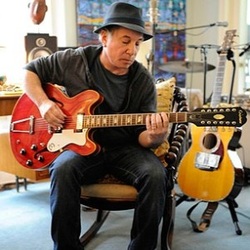
Dear Neil,
I believe the Grammys have done a disservice to many talented musicians by combining previously distinct and separate types of music into a catch-all of blurry larger categories . Zydeco, Contemporary Jazz, Contemporary and Traditional Folk , Norteno, Tejano and Latin Jazz in particular are singular in their heritage and musical skills and structures. They deserve the separate Grammy acknowledgements that they’ve been afforded until this change eliminated them.
I understand the problem of having too many categories, but maybe that’s what it takes to represent the constellation of musical styles and “ethnic” cultures that define America today. I hope The Grammys will re-consider and restore at least some of these unique categories.
Sincerely,
Paul Simon
=============================================================================================
June 30, 2011 Press Release Regarding the Lawsuit Against NARAS
You will notice the name Sarah R. Bisconte on the document below. Ms. Bisconte offered her services as a publicist of great experience and talent to Bobby Sanabria in pursuit of Bobby's campaign to restore the 31 categories. On June 30th she organized a press conference at the offices of Attorney Roger Maldonado in Manhattan, together with his staff, to announce that a suit was being brought against NARAS and boycotting CBS. Below is a copy of that press release. That was the second and last press conference and was a resounding success.
Many local and global media outlets joined to cover the campaign following this announcement, including every major news wire like AP, AP Spanish desk, BBC, BBC Spanish, AFP, EFE and Reuters. Some outlets that carried the story are located in the US, Canada, the Caribbean, Spain, France, Pakistan, England, the Philippines, Taiwan, Singapore, India, Malaysia, United Arab Emirates, Dubai, Ghana, South Africa, New Zealand, Australia, Malta and Vietnam and Polynesia.
Ms. Bisconte was instrumental in getting Edward James Olmos to attend the LA press conference last year where he delivered remarks. A local TV affiliate broadcast his remarks. She was also responsible for getting the Rev. Jesse Jackson and Dr. Cornel West onboard in January, 2012. Her input and media savvy have put wheels on the campaign. ~ Travis
===========================================================================================
FOR IMMEDIATE RELEASE
Bobby Sanabria
[email protected]
Sarah R. Bisconte
914.310.0467
[email protected]
MUSICIANS ANNOUNCE BOYCOTT OF CBS AND LAWSUIT AGAINST THE NATIONAL ACADEMY OF RECORDING ARTS AND SCIENCES OWNERS AND PRODUCERS OF THE GRAMMY AWARDS FOR ELIMINATION OF THEIR CATEGORIES
NEW YORK, NY -- June 30, 2011 – Bobby Sanabria, world-renowned Latin music and Jazz artist, percussionist, educator and four-time Grammy nominee, stated today at the law offices of Balber, Pickard, Maldonado & Van Der Tuin PC in Manhattan that, on behalf of more than 3000 musicians worldwide, a boycott will be organized against CBS, the network that broadcasts the Grammys to millions of viewers globally, and a class action lawsuit will be filed against the National Academy of Recording Arts and Sciences (NARAS), owners and producers of the Grammy Awards, for the elimination of Latin Jazz, and 30 additional music categories.
Sanabria has retained Roger Maldonado, Esq. of the aforementioned law office and attorney Juan Saavedra Castro, to file the class action lawsuit against NARAS.
In his opening remarks, Sanabria said, “On April 6, 2011 the Grammys, without warning to or consultation with its 20,000 members or Board of Governors in each of the Grammys 12 Chapter cities, announce the elimination of Latin Jazz as well as 30 other categories. Over 70 percent of the cut categories are comprised of ethnic minorities.
NARAS members comprising these categories were unfairly led to believe that their released recordings of this past year would be eligible for submission in the now eliminated categories. The cuts were done by a secret sub-committee of 12, which NARAS refuses to reveal, in direct violation of the NARAS bylaws. To date, NARAS refuses to offer a valid explanation as to why it has made these culturally-insensitive and economically-damaging cuts.”
Roger Maldonado, the lead attorney on the case, said, “Bobby Sanabria has asked Juan Saavedra Castro and my firm to bring a complaint on his behalf, as well as on behalf of other Latin Jazz musicians, challenging the Academy's arbitrary elimination of Latin Jazz as a category for consideration for the Grammy Award. We hope to work with others to help restore all 31 categories of music for consideration for the Grammy Award.”
Speaking about the human toll of the NARAS decision, Sanabria said, “The real inherent damage is not only the racist actions of NARAS, given that more than 70 percent of the categories are ethnically - and racially-based, but the adverse affect the decision will have on more than 155 recording artists every year. Those artists will never be able to say and advertise that they are Grammy nominees. This will adversely impact their ability to get better-paying gigs, and will severely diminish all of the prestige that goes along with winning the most coveted award in the music industry. That incalculable cost is heartbreaking for the artists and the recording industry.”
Angelo Falcon, president of the National Institute for Latino Policy, the organization that is working closely with Sanabria and the Grammy Watch coalition to bring about the boycott added, “The Grammys' decision to eliminate so many categories not only flies in the face of its mission to educate the public about all forms of music, but willa also negatively impact on the careers of so many Latino and other musicians.The organization is clearly at a crossroads at this moment, and the battle today is over preserving its soul.”
Grammy Watch Group is a coalition comprised of renowned musicians and supporters of the arts. Some of these individuals include: Eddie Palmieri, Larry Harlow, David Amram, Mercedes Ellington, Cándido Camero, Arturo O’Farrill, Wilson “Chembo” Corniel, Ibrahim Gonzalez, René López, John Santos, Clay Leander, Ricky Gordon, Paquito de Rivera, Brenda Feliciano, Iván
Acosta, Ben Lapidus, Brian Lynch, Jimmy Sturr, Rachel Z, Jackie Harris, Ned Sublette, Elvira Franco, T. J. English, Jochem Becher, Ramón Ponce, Wayne Wallace, Oscar Hernandez, Dr. Chris Washburne, Sandy Cressman, Randy Klein and Bobby Matos.
These artists and other concerned citizens have led protests and organized press conferences in New York City, San Francisco and Los Angeles, to voice their opposition against the ill-advised decision by NARAS.
For additional information, including letters and statements of support from Carlos Santana, Paul Simon, Bill Cosby, Edward James Olmos, Ruben Blades, Herbie Hancock and other major artists, and to sign a growing petition, please visit
www.grammywatch.org
==========================================================================================
Jazz Great Mark Levine Returns Grammy Medals in Protest

Jazz musician and past NARAS President Michael Melvoin saw it coming:
“We’re losing numbers already, and the trickle will become a flood.”
His remarks contrast a vision of increased growth, diversity and
participation of NARAS Membership from a mere 8,000 in the 1980s to over
27,000 at its peak in the past decade; but has already shrunken by 6,000
members under the administration of current academy president Neil
Portnow.
Melvoin, among the first to express solidarity with musicians protesting NARAS’'
drastic cuts to the GRAMMY Awards, shared his perspectives in the June 2011
Overture magazine published by Local 47 of the Recording Musicians Association of Los Angeles, which passed a Resolution opposing the cuts. “I think it’s a rash move meant to downsize the expense of everything, but they’re taking it out on musicians, particularly Latin Jazz, Zydeco, Rock Instrumental, things we’ve really devoted our entire lives to doing.” said Melvoin. “There is no longer a fair way to be judged.”
Before Mr. Melvoin's remarks were published, veteran Jazz musician Mark Levine, already disgusted by the decision, immediately wrote to the Recording Academy renouncing his membership, and informing fellow colleagues that he'd quit the organization.
Composer, bandleader, pianist, trombonist, educator and author of books on Jazz theory and technique, Levine has more than paid his share of dues for over 50 years. He's participated in numerous Grammy nominated and Grammy winning recordings including with Latin and Jazz inovators Mongo Santamaria, Cal Tjader, Carmen McRae, Joe Henderson, Poncho Sanchez and on his own recordings. His crowd-pleasing composition "Linda Chicana" (aka "Sheila") a widely recorded standard, is still performed by a range of established Latin and Jazz groups, to club bands, and youth and college ensembles.
As he learned more about NARAS' cuts to all of the award categories, his outrage at the travesty deepened. "Yes, they're cutting Latin Jazz, but also Gospel, Blues, Hawaiian, Polka, Zydeco, Classical Music -- geez, that's the heart of American music," Levine remarked to fellow colleagues. "They're cutting the heart out fo American Music."
However, Portnow, instead of responding to Levine’s previous letter, further demonstrated himself as increasingly disconnected from the NARAS Membership when he sent this:
=============================================================================================
Dear Mark -
On behalf of myself and the Board of Trustees, I would like to congratulate you for over 35 years of membership in The Recording Academy. In recognition of your long standing support of The Academy and its initiatives in the areas of education, archiving and preservation, health and human service and advocacy, the Board of Trustees has bestowed upon you Life membership in The Recording Academy.
As a Life member of The Recording Academy your current membership will continue uninterrupted. You will have three options as it relates to dues payment:
1. You can donate your dues to MusiCares or The GRAMMY Foundation.
2. You can donate your dues to support The GRAMMY Museum.
3. You can choose to not pay any dues and continue to enjoy your membership.
As the recording industry has changed over the course of your membership, the one constant has been the support and passion of The Academy’s members. Your decades of support have helped transform The Recording Academy to what it is
today and your continued membership will help shape its future.
Kind regards,
Neil Portnow
President/CEO
=============================================================================================
Let’s take that again: “Your decades of support have helped transform The Recording Academy to what it is today“. Needless to say Portnoy’s letter got several rounds of unfunny, maddening laughter from Mark’s colleagues. But this is not what Mark signed up for.
With the momentary gag quickly worn off and seriousness setting in, Levine issued this letter to Neil Portnow:
=============================================================================================
July 20, 2011
Neil Portnow, President
National Academy of Recording Arts & Sciences
3030 Olympic Blvd
Santa Monica CA 90404
Dear President Portnow,
I am returning my 2003 Grammy Nomination medal and plaque to NARAS, and my 2010 Latin Grammy Nomination parchment to LARAS. I’m also refusing your offer of a Life Membership. I no longer want to be associated with your organization.
Your actions in delisting the categories that have most contributed to American music have been racist, and go against
everything my parents taught me about America.
To quote Frank Sinatra at the original Grammies awards ceremony in 1959: “Remember ladies and gentlemen, it’s about excellence, not popularity.”
Peace,
Mark Levine
===========================================================================================
In less than 24 hours, Levine’s letter circulated among colleagues and posted on Latin & Jazz websites, and went viral on social media. Several other NARAS Members have already resigned or announced their intention to do so.
As for the return of awards, another prominent Jazz musician wrote this:
“Dear Recording Academy, if I give back my two nominations from a few years ago, will you restore the 31 categories of important music that you just threw away, in an effort to make your awards “more prestigious”? The nominations mean less now, because they represent a shallow view of music. I’m embarrassed to have the Grammy emblem on a certificate.”
============================================================================================
NARAS’ insistence on continuing down this path was both cautioned with consequences but also offered a remedy by past Recording Academy President Michael Melvoin, in his statement presented on May 9th at the first of a series of musicians’ press conferences, aimed at the current NARAS leadership, and to the Membership:
“Matters of competence, governance, and management. All have been seriously lacking. All those responsible for this tragic turn should face the consequences and step aside. The membership has the duty to replace them.So first, rescind the changed category policy. If that happens, it appears unlikely, then a hard discussion in the Board Of
Trustees at the May meeting, of the internal problems must begin, toward the end of replacing those responsible for this slap in our face. If the restoring of the categories does not happen now, The Academy can expect the fire to grow and spread, and a loud public exodus of those insulted, and open discussion of all the problems being hidden. Everyone who has ever played an instrument has had the possibility of receiving recognition from the Grammys gutted. That cannot and will not stand.
Scream now and scream loud!
MM”
============================================================================================
Without corrective measures, NARAS will only succeed in further rendering the intent and meaning of the GRAMMY Award worthless, while rendering itself irrelevant.
Carlos Santana Weighs In

motivated.
“I think they’re racist. Period. I do,” Santana said in an interview a Canadian newspaper.
His comments came after the NARAS decision in April to eliminate music categories that mostly included artists of ethnicity. The categories eliminated included: Best Latin Jazz Album, Best Contemporary Jazz Album, Best Cajun & Zydeco Album, Best Native American Album and Best Hawaiian Music Album.
The previous seven Latin categories were cut to four also, saying that there were duplicate categories in the Latin Grammy Awards ceremony and the English-language awards. Three R&B vocal performance awards for males, females and groups were also merged into one R&B performance award.
“First of all we have so many categories of Country & Western. Country & Western people have seven to nine to 10 (awards) shows a year and you seldom see Negroes or Latin people,” Santana told The Providence. “You can’t eliminate black gospel music or Hawaiian music or American Indian music or Latin jazz music because all this music represents what United States is: a social experiment.”
Santana also went on to comment on the Academy’s decision making process.”They didn’t even tell other members, only certain people voted, overnight. A lot of people didn’t know this had passed. Quincy Jones didn’t know, Herbie Hancock didn’t
know...I’m not afraid if they don’t invite me again,” he added. “I’m not afraid to say that it’s basically racist.”
===========================================================================================
A Posting from Bobby Sanabria from November 27, 2011 --
This is What We're Fighting For
I thought it was apropos to post it again...
On Sun, 11/27/11, Bobby Sanabria wrote
Remember how the Grammys used to be?
Thought all of you would dig this and find it inspiring (and depressing)...
Ache', Bobby Sanabria
Randy Brecker, Chuck Findley, Arturo Sandoval, Bryon Stripling play the shit out of Cherokee opening with Clifford Brown's solo at a blistering tempo. Will Kennedy on drums. M' Fers!!!
If you're listening Rod, take me back in a time machine, please!!!
Ache' (positive energy),
Bobby Sanabria
===========================================================================================
Even Al-Jazeera Covered the Story... December 15, 2011

Music moves hearts and feet as well as minds, which is why it has always been
the secret weapon of choice used by the State Department to garner support
overseas. It also drives our cultural industries to market music - not just as a
money-making export, but also as an inspirational and powerful social force.
Entertainment companies understand these values and have become international salesmen for the sounds of a higher consciousness, as international sales now account for more than half their revenues.
Awards shows like the Oscars and Grammys attract audiences in the billions because of the ways in which their creators - who are also increasingly international - find ways to transcend borders and resonate with the feelings and sensibilities of a vast audience. In the farthest corners of the world, you will now find local rappers emulating a musical form born in the South Bronx. Go to the world's bars, joints, concert halls and dance floors, and you will see the influence of Latin music and jazz.
This has happened in part as our country has birthed a plethora of cultural streams and artistic communities, and then awarded their most talented representatives with global visibility.
There has always been tension between those who are there just to cash in and commercialise creative expression, and those who see musical diversity as a source of strength and the reason that America is so, well, American.
Sometimes the profiteers and the performers fuse, but more often than not there is a clash between parochialism and universalism, between the revenue-maximising suits on top and the struggling artists who serve and advance musical traditions that are not always in the mainstream, even as musical geniuses transcend genres.
Today, there is a cultural war underway in the world of the Grammys as well as in the courts. A battle is now being waged between NARAS, the professional academy that gives out the awards, and many performers who are now being driven out of competition because of a decision to eliminate musical categories that have long been part of the mix.
You can understand why bottom-line-oriented TV executives and advertisers might want to streamline and package events to maximise ratings and profits by only showcasing big stars. But what they don't get is that eliminating key musical traditions leads to homogenisation. It turns branches of the American musical tree into endangered species by denying them visibility and global exposure; it robs the audience of a chance to see and appreciate new music.
The BBC in London recently interviewed Bobby Sanabria, a multi-Grammy nominated jazz, Latin jazz, and Latin music artist. He is now the lead plaintiff on the historic class-action lawsuit filed on August 1 in the New York State Supreme Court against NARAS for its elimination of the Latin jazz category.
Sanabria believes that cutting 70 per cent of the categories affecting minorities is fundamentally racist. According to Sanabria, "It leads to a lack of diversity in the Grammy broadcast that then focuses more on stars and celebrities turning it into a corporate showcase of big stars. The Grammys were also formed to champion marginalised forms of music and educate the public."
Another artist, Dr Ben Lapidus, is denouncing what the Grammy overlords have done. He is a Latin jazz artist, associate professor of music, and a 10-year member of NARAS. Writing in Latin Beat Magazine, he explains:
On April 6, 2011, I, and the rest of the 21,000 members of the academy received an email from NARAS announcing a major restructuring of the Grammy awards. Chief among these changes was the elimination of 31 award categories. Some of the cuts included Cajun, Zydeco, Native American, Contemporary Jazz, Traditional and Contemporary Blues and Gospel. Two dissimilar Mexican categories were also combined and Latin jazz was eliminated.
I was stunned. It was 1994 when Eddie Palmieri finally won a struggle that began 17 years earlier for the establishment of the Latin jazz category. Since then, the success of Latin jazz as a category (and as a music) has grown nationally and internationally.
What an insult to all of us (and our supporters) that such a monumental decision was announced with an email, after no consultation and no chance for an informed debate! Not even the chapter governors in the 12 Grammy Chapters around the United States, who are elected by the membership to represent us, were consulted.
This top-down decision was announced without any debate. A meeting was called and then prominent artists were excluded from it. Tempers flared at this anti-democratic and culturally offensive process.
Lapidus explains: "It is my understanding that NARAS, as a not-for-profit entity, is required under applicable law to operate in a clear and transparent manner. It certainly did not do so in arriving at the determination to eliminate the 31 categories of music."
There were originally 109 categories; they have now cut them down to 78. News organisations that seek comment from NARAS have had no response.
In response, a lawsuit has been filed against this exclusionary process. Of course, the music organisation can't be forced to recognise minority artists, but their decision has caused a definite backlash.
The problem with going to the courts is that issues often turn into legalistic narrow bureaucratic procedures like whether the NARAS constitution permits this type of behaviour. But in fact, the heart of the matter are the morality and importance of its actions. That’s why it is essential for the artists to bring their case to the court of public opinion.
It's ironic that in a country that now has a president of colour and seems to have come a long way towards eradicating traditional forms of discrimination, a major organisation can take a step that alienates its members and displays audacious cultural insensitivity.
Impassioned publicist Sarah R Bisconte has been able to get this story out all over the world, especially in the British media. However, many star-promoting US entertainment outlets and cable news networks have ignored the controversy so far, even though Carlos Santana, Paul Simon, Herbie Hancock, Bill Cosby, Bonnie Raitt, Ruben Blades and many other luminaries are backing the Latin artists.
With all that hangs in the balance, don't be surprised if there's an Occupy the Grammys at next February's big Grammy TV show.
Danny Schechter
www.mediachannel.org
==========================================================================================
This was delivered to Bruce Springsteen's manager February 6 to be given to Mr. Springsteen...
I am a 5X Grammy nominee as a bandleader,drummer, percussionist in the category of Latin Jazz and asking for your help.
On April 6,2011 NARAS unjustly cut 31 categories that represent America's musical/cultural diversity from the Grammys. Over 70% of those categories represent racial and ethnic based forms of music - Zydeco, Cajun, Latin Jazz, Contemporary Jazz, Instrumental Country, Traditional World, Polka, Traditional and Contemporary Gospel, Traditional and Contemporary Blues, the list goes on and on. This was done in secret by NARAS with absolutely no input from any of the 20,000 members or any of the Board of Governors in any of the 12 Grammy chapter cities.
A letter was sent signed by major stars like Herbie Hancock, Carlos Santana, Stanley Clarke, Ruben Blades, Eddie Palmieri and many others like yours truly to Grammy President Neil Portnow and the entire Board of Trustees when all this happened
and they didn't even have the courtesy to respond. The decision was made by a sub-committee of 12 that has met secretly for 18 months commencing right after Herbie Hancock won for Album of the Year in 2009. To date this is the biggest act of cultural insensitivity instituted by a non profit arts organization in the history of the United States. Carlos Santana has publicly called the action by NARAS as racist and ignorant.
Since this uni-lateral unjust decision was announced by NARAS on April 6, 2011 with no due process from its membership, the public outcry, particularly in the Latin Jazz community has been incredible. Major stars like Santana, Bonnie Raitte, Herbie Hancock, Allison Krause, Bill Cosby and others have spoken publicly against it. As I stated before, Carlos Santana has publicly declared the action by the Grammys to be racist, ignorant, and he doesn't care if he is ever invited back by the Academy.
These categories were fought for for years. In the case of the Latin Jazz category, it was fought for for 17 years!!! At the April 11, 2001 damage control meeting President Portnow had with the NYC membership he actually opened the meeting by stating, "The Grammys have become too big of a diverse collage." The attending Grammy members were in shock. Trombonist Dr. Chris Washburne responded by stating, "That's what this country is!"
In an age where we have a bi-racial President in our country and America is more diverse than ever before, the message the Grammys are sending out is that it DOESN'T CARE ABOUT CULTURAL/MUSICAL DIVERSITY. It is is this diversity that is our strength! The countless number of musicians, producers, music writers, arrangers, engineers, etc. at small independent record labels have been devastated by this decision as they will not have the opportunity to share in the honor and work that is generated by getting a Grammy nominatin, let alone a Grammy win. Therefore it is also a human rights issue as it economically affects the industry's workers, the musicians.
We have been obfuscated at every turn by the Academy. The final insult is that they refuse to release the minutes of any of the meetings of this secret sub-committee despite it being our right since under California Law NARAS is a 501C6 membership organization. By Law they HAVE to give us these minutes upon a formal request by any member. We have been refused on several occasions.
Because of this Reverend Jesse Jackson has gotten involved supporting our cause as well as Cornell West. http://www.hollywoodreporter.com/news/grammy-awards-nominees-jesse-jackson-categories-285420
We have a website gramywatch.org where you can see the petition that has been signed by many well known figures that you personally know. Present.org, the leading Latino civil rights advocacy group is also supporting our cause and will be present with us this Thursday in a press conference that will be held at 10:30am in front of the offices of the Grammys in L.A. where they will present to Neil Portnow thousands of signatures protesting NARAS's actions and announce the picket/protest/boycott/demonstration that will occur the day of the award show which will have union leaders, fans, musicians, etc. standing in solidarity. Besides this, I and three other musician/educators; pianist Gene Marlow, guitarist Ben Lapidus and pianist Mark Levine have filed a landmark class action lawsuit against the Academy in New York State Court.
You as as an artist that has constantly stood by the working person are the epitome of what we are fightng for. We are asking you to please boycott the Grammys until they bring back all the 31 cut categories. If you do decide to appear, can you please at least make a public statement on the telecast. It could be as simple as yelling out on the final chord of your performance, "BRING BACK THE 31 CATEGORIES UNJUSTLY CUT BY THE GRAMMYS!!!"
Again, there will be pickets by musicians of the affected categories,the general public as well as union members from various locals protesting this injustice near the Staple Center.
With respect...
Ache' (positive energy),
Bobby Sanabria
www.bobbysanabria.com
grammywatch.org
Some salient points by fellow NARAS member, 5x Grammy nominee John Santos...
1. NARAS, a non-profit organization is supposed to honor excellence in the music of our country and be an advocate for those musical communities represented by its membership.
2. Most of the categories they dumped are the least commercial but among the most creative and important "roots" categories that represent what ethnic diversity the Grammys might claim.
3. Their decree direly affects current and future generations who will feel the economic and cultural repercussions of this action. This includes hundreds of thousands of fans, musicians, producers, record labels, CD manufacturers, graphic
designers, music festivals and presenters, night clubs, music schools, radio programmers, teachers and students of the eliminated categories.
4. NARAS' actions must be exposed and reversed, as they only serve the most commercial musical interests to the complete detriment of some of the most creative and ethnically diverse musical communities in our country. They have reversed hard
fought battles and decisions of the last three decades to create categories that recognize more American music than just the most profitable.
5. We must stand up for the art forms, practitioners and supporters that do a great deal to raise the creative aesthetic in our communities.
6. With the elimination of Latin Jazz, Traditional World Music, and, certain Mexican categories, the Latino US legacy is directly dissed by NARAS, but we must also stand in solidarity and resistance with the Native American, Black American, Creole, Hawaiian, and Eastern European ethnic groups that have also been eliminated.
7. In addition to the "ethnic" eliminations, creative musical categories such as Instrumental Rock, Contemporary Jazz, and Classical Crossover have been cut.
8. NARAS officials speak and write about education and social strategy, but fail to see the hypocrisy and the ramifications of further disenfranchising entire communities from the Grammy process. As the good Reverend pointed out, "Sometimes inclusion is inconvenient but it's the right thing to do."
9. Disrespecting and ignoring the musical expression of these communities also carries deeper repercussions than the immediate economic hits. Kids and youth who have spent years studying these types of music and have been properly
taught to see music with a broad perspective are now confronted with the further invalidation of non-commercial music, narrowing their appreciation and understanding of music to only the most visible and most highly promoted which is clearly not where all the quality and creativity lie. It is obviously devastating to teachers who have spent our lives trying to give students rich alternatives to the top 40 mentality spoon-fed to them via mass media at every moment.
10. Grammy affiliation is a dream for musicians of all ages who seek to exceed. It is arguably our country's highest musical recognition and translates into valuable recognition and often remuneration. It honors their life work and families as well as their extended musical communities of colleagues and supporters.
11. This senseless action by a handful of culturally uninformed individuals cannot be allowed to stand simply because NARAS doesn't want the black eye.
12. The honorable Reverend Jesse Jackson, Cornel West, the San Francisco Art Commission, Herbie Hancock, Eddie Palmieri, Paul Simon, Carlos Santana, Bill Cosby, Esperanza Spalding, Bonnie Raitt, Stanley Clark, Ruben Blades, David
Amram, Pete Escovedo, Oscar Hernandez, Larry Harlow, Mark Levine, Wayne Wallace, Bobby Matos, and Bobby Sanabria are just some of the well-known folks who have spoken up against this action.
15. Concerned NARAS members and other individuals have met with NARAS administration and staff, held bi-coastal press conferences, written and rewritten proposals and related posts and letters ad-nauseam, all to no avail. The time has come for the court of public opinion.
=============================================================================================
The Protest and Presentation of Petitions at NARAS Headquarters...
February 9, 2012
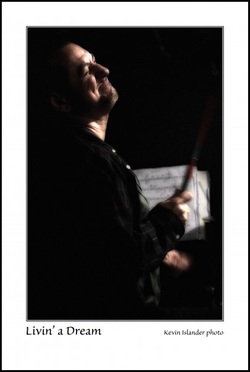
Drummer Ronnie Ciago addressed the issue with these words:
"My name is Ronnie Ciago. I am the drummer, percussionist and composer with world-renowned instrumental progressive rock band called "Brand X"--the new Brand X line-up including David Sancious. The Grammy Committee wants to eliminate "Instrumental Rock" from its categories. I am asking the Grammy
Committee to please reconsider and keep our true culture alive. Taking out
Instrumental Rock is like taking George Washington out of our history books. We
need to continue to learn and grow with diversity. To name just a few who have
already condemned the National Academy of Recording Arts and Sciences' actions are: Herbie Hancock, Eddie Palmieri, Paul Simon, Carlos Santana, Bill Cosby, Bonnie Raitt, Stanley Clarke and many others. We are also extremely encouraged by the support by Rev. Jesse Jackson. I applaud you and thank you for your support."
==============================================================================================
Press Release Regarding the Protest of February 9, 2012
SAX PR/Marketing
818-508-7660
[email protected]
Presente.org and GRAMMYWatch.org Announce Protest of GRAMMY Awards For Portnow and the NARAS Brass’
Irresponsible Decision to Delete 31 Categories of “Roots Music”
Musicians and community leaders bearing 23,000 petitions invite even more community to join them as they commit to continue the fight
LOS ANGELES ( February 9, 2012) --
In a collective show of strength and unity, musicians, enthusiasts of diverse musical genres, and community leaders gathered today in front of the National Academy of Recording Arts and Sciences (NARAS) headquarters in Santa Monica, California, to
demand that the organization immediately restore music and cultural diversity to the GRAMMY awards by re-instituting all 31 GRAMMY music categories that were eliminated in April 2011 by GRAMMY president Neil Portnow and a small group of top executives. Speakers and community members also denounced the anti-democratic way in which the decision was made, as none of NARAS' 21,000 voting members were consulted.
Speakers also announced a protest rally to take place on Sunday, February 12 at 3:30 p.m. at the corner of Figueroa Street and Pico Boulevard near the Staples Center, site of the 2012 GRAMMY awards ceremony. Community members were also invited to a concert immediately following the protest rally on February 12. The concert, to be held from 5:00 pm-8:00 pm at the
world-renowned Mama Juana's nightclub in Studio City, will feature music representative of the 31 genres that were eliminated. Some of these categories include: Latin jazz, traditional and contemporary blues, Hawaiian, Mexican Norteña, polka. Native
American, R & B, gospel, traditional and contemporary jazz and Cajun/Zydeco.
Bobby Matos, a leader in the GRAMMYWatch movement to reinstate the deleted categories stated, “Our movement to reinstate the 31 categories is growing. People from across the United States will watch the GRAMMYs on Sunday and see a televised display of the shame, greed and discrimination that GRAMMY president Neil Portnow and his small minority of industry insiders are imposing on the music of the majority. Our country looks more like the musicians impacted by this disturbing decision; and
the musical map of the country sounds more like the roots music that Portnow and the GRAMMY executives have now put at great risk. This is a travesty for anyone who loves music and community.”
On Sunday, February 12, the GRAMMYs will air its annual awards show on the CBS TV network with far fewer categories than
in the past. The Academy eliminated nearly one-third of its categories, thereby decreasing the number of 2012 GRAMMY Awards from 109 to 78. The decision by NARAS greatly reduces the opportunity for the artists performing and creating the music in the affected categories to win the music industry’s top award. Some of the eliminated categories include Latin Jazz, Traditional and Contemporary Blues, Cajun/Zydeco, Contemporary and Traditional Jazz, Polka, Mexican Norteña, Native American, Gospel, R & B and Hawaiian music.
NARAS, the producers of the GRAMMYs, made the decision to eliminate these and other categories, comprised mostly of ethnic music, without the knowledge of or input from the organization's 21,000 members or their elected representatives; and, in so doing and by failing to apply the new eligibility criteria in a non-discriminatory manner, violated NARAS' own bylaws and procedures.
Arturo Carmona, Executive Director of Presente.org, the largest online Latino advocacy organization in the country, said: "NARAS' cruel decision to cut 31 GRAMMY categories, mostly comprised of ethnic music, is a blatant violation of the music rights of musicians and of entire communities. We demand that NARAS reverse its decision immediately. Make no mistake! The message we are sending is simple: We want all of the categories back now!”
For more information and public statements of support from music luminaries calling for all 31 GRAMMY cuts to be
restored immediately, please visit www.GRAMMYWatch.org.
About Presente.org
Established in 2009, Presente.org, with more than a quarter million members, is a major national organization dedicated to amplifying the political voices of Latino communities in the United States. For more information, please visit www.presente.org
=============================================================================================
A February 10, 2012 Letter to Neil Portnow and the NARAS Leadership;
the Grammy Watch Petition
Date: February 10, 2012 6:54:06 PM EST
To: "[email protected]" <[email protected]>, [email protected], Leslie Ann Jones <[email protected]>, [email protected], [email protected]
Subject: Grammy Watch Petition - 5,967 Signatures to Add to Presente.org Petition
Dear Neil and NARAS Leadership,
Please find attached the Grammy Watch petition that is now 5,967 people (408 pages long - including comments) who believe your decision to cut the 31 categories is wrong and believe you should reinstate them immediately.
I add these signatures to the 20,000 plus signatures that Presente.org has accumulated and these petitions continue to grow every day.
When I first presented this petition to you in May in San Francisco, Neil you readily dismissed it, saying it didn't count if the signatures were not a member of NARAS. I disagreed then and still do.
These signatures definitely do count. The continuing effort to spread the word and to protest since last April, has been able to
spread the news of this injustice you handed down on American music has now caught the attention of the world, as you well know.
My hope is that positive changes will be made immediately to create a climate that supports the ENTIRE American Songbook, as NARAS is a national institution symbolizing the best in American music - ALL American music, and you have an ethical responsibility to assure that all cultures and genres of America are included.
As many have stated, while it may be inconvenient to do the right thing, that does not mean you have an excuse to not do so.
These two petition lists now out number the entire constituency of the NARAS membership, and if you were me, I would not underestimate these petitions again, that would be the definition of foolishness.
Lastly, I will be on the picket line Sunday along with many others, but do not think the efforts to correct this wrong end this Sunday. They will continue until the categories are reinstated.
For thought... as I do think this is a situation that truly captures the essence of what Gandhi said, "Never underestimate the power of a few committed people to change the world."
Sincerely,
Stephanie Dalton, Director
Urban Music Presents
2588 Mission Street, Suite 215
San Francisco, CA 94110
www.urbanmusicpresents.com
===========================================================================================
From a Former Board of Trustee Member of the National Academy of Recording Arts and Sciences... Who Wishes to Remain Anonymous
2. There is a culture of racial and gender inequality in their membership, staff and elected leadership.
NOTE: If someone really did the math too, they'd find it were the same across the board in the Grammy, Hall of Fame and Lifetime Achievement awards given as well.
3. Their 2010 membership survey shows that 74% of their membership is male. 26% female.
4. 55% are ages 35-54
5. While the majority (over 70%) believe the membership is ethnically diverse. 3 in 4 NARAS members are white
6. 12% black and 6% Latino.
NOTE: Another problem: NARAS P&E Wing boasts that half of the voting members are producers & engineers, who also now get more Grammy's than genre specific recordings.
7. The Reverend Jackson talks about how creativity incubates in poverty: Traditional Blues category that was folded with Contemporary to create one large Blues Category this year reflects one wealthy black man (Keb Mo) was nominated and four (predominantly) white artists/groups Greg Allman, Warren Hayes, Derek Trucks (and Susan) and Marcia Ball.
NOTE: The mainly white voting body understands the Keb Mo's of the world, but not the Hubert Sumlins and the Henry Gray's b/c they're buffered from it in Nashville, Los Angeles and NY which are the biggest three voting chapters. Where are the source musicians? At least when there was a traditional blues category there were more black artists with nominations.
8. The Best Rock category this year has all male noms. In 2005 they dissolved the Best female Rock due to low entries. Now how does one explain this. With more music being recorded than ever before, how is it the numbers got so low they fell below the required 25 consistently enough to fold the category? The music is being made, NARAS just has failed to engage the women artists creating it.
9. Why? Because the men at NARAS are not having the discussion. Staff is not either. Not even the female staff.
10. In the 54 year history of the Academy, only one woman and one black man has governed in the top elected position as Chair of the Board.
11. While NARAS/Grammy Foundations do employ women, they are white and I can't tell you how few black men I've seen employed at the Academy.
12. Two years ago they terminated their only executive level black woman at Headquarters, Angela Bibbs Sanders, who had been with them for 15+ years. There may now be one or two other Chapter Executive Directors who are black women. All of this can be verified online at their website.
13. The current chair who was re elected unopposed is fr Nashville , an all white Chapter and music community.
14. NARAS dismisses the smaller chapters like Chicago & Memphis with the strongest black music culture, history and identity.
15. Racism, sexism, cronyism and favoritism prevail: LL Cool Jay hosted their Nominee Show in December and he's back hosting the Grammy show. How obvious can this favoritism be? The Foo Fighters have performed on the Grammy's more times than I care to remember.
==========================================================================================
A Letter from Bobby Sanabria... February 10, 2012
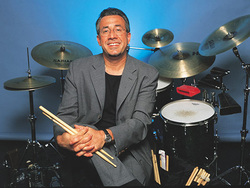
Hi Travis,
Thanks for helping on this and spreading the news. Paul Simon, Bonnie Raitt, Herbie Hancock, Santana, Ruben Blades, Alyson Krause and many others have spoken out on this infamnia to no avail from Portnow and company. We even sent a written protest to Portnow and the entire Board of Trustees signed by all these stars and many more at the very beginning. Their response? Silence!
The kicker is that they did this by forming a secret subcommittee of 12 that began meeting in secret right after the 2009 Grammys for 18 months. Absolutely none of the Grammy Governors (elected by we the members in the 12 Grammy chapter cities) knew anything about this or where consulted. None of we the membership (20,000) were asked or warned. They just went ahead and did it like a totalitarian regime. What do we pay dues for?
Since Portnow has come into office, 2002, the Academy has become more corporate and less about music. It's ironic, an organization founded by musicians for musicians now is against musicians and completely corporate friendly to the big labels and their artists. The Academy always prided itself on being a buffer between musicians and the bigwigs. That changed with Portnow.
The Academy was founded to not only celebrate but to also propagate all forms of American music and to educate the public about all these forms so that the recording industry can grow in diversity. That is in the mission statement of the Academy.
Let everyone know about Sunday, particularly musicians from the other affected categories and members of unions. I sent
Springsteen a personal appeal. We're hoping that he will say something on the broadcast given the fact that he's made his career championing the cause of the working person.
Hope to meet you on Sunday. I fly into LAX from NYC tomorrow at xx am. My cell is xxx.xxx.xxxx
Ache' (positive energy),
Bobby Sanabria
===========================================================================================
If You Are In L.A. on Sunday February 12...
A Party You Don't Want to Miss!!
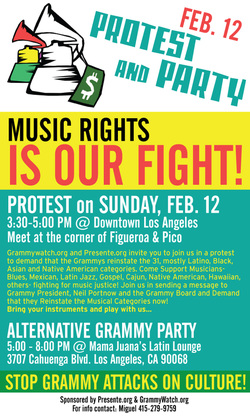
Dear All,
The plan is to congregate at the corner of Pico Blvd. and Figueroa St. in Downtown Los Angeles at 3:30pm (Area 1 Blue Pin on Map) We will rally there
and then move to other key locations around the venue.
There are parking lots surrounding the Staples Center Area, though I am sure many of the locations closest to the venue will be hard to get to because of street closures.
Here are a few recommendations:
Go early in anticipation of these closures
Take public transportation, there is a Metro stop within walking distance
You could meet up as a group take the metro from Universal Station (which is close to Mama Juanas)
Bring some homemade signs, your instruments, some water bottles, sun-block,
Thanks a lot and see you on Sunday.
Miguel Perla
Community & Government Relations Consultant [email protected]
============================================================================================
LA Times Article. February 11, 2012.
Grammy Awards: Musicians will protest category reductions
February 11, 2012
Some days, it just doesn't pay to try and hand out trophies.
The Grammy Awards, which roll around again on Sunday, have long been a popular target for criticism from musicians (think Kanye West), music writers and, on more than oneoccasion, "The Simpsons" creator Matt Groening (Homer's response upon being reminded that he once won a Grammy: "I mean an award that's worth something!").
The Grammys have been accused over time of being out of touch, of favoring commercial success over artistic excellence and of being bloated with too many categories (110 at its peak, compared with about two dozen for the Academy Awards).
This year, the music industry organization that bestows the gramophone-shaped trophies is taking more hits than ever for its attempt to slim the awards ceremony down by restructuring various categories to bring the total down to 78. The greatest reductions took place in R&B, American roots music, classical, Latin, jazz, country, pop and rock fields.
Dozens of musicians have complained about the Recording Academy's elimination of categories that had offered industry recognition to specialized genres. Many plan to demonstrate outside Staples Center on Sunday as their peers file in to see who does take home Grammys this year. On Thursday, protest petitions were presented to Recording Academy officials signed by about 23,000 people.
"In the bigger picture, diversity is important," said Latin jazz musician Bobby Matos, who also will play Sunday afternoon at an "anti-Grammy" concert and jam session at Mama Juana's restaurant in Studio City, in part because the Latin jazz category was among those eliminated.
"It's not all just about pop music, hip-hop and country," said Matos, one of the musicians behind Grammywatch.org, which formed last year in opposition to the category restructuring. "We deserve some recognition, and if we're not recognized by the organization that purports to recognize artistic excellence, then we become invisible and irrelevant."
Sunday's jazz jam is one of several events being staged by those who feel disenfranchised by the new rules. The shows and protests are a way both to salve wounded feelings and to give those who won't be in on the Grammy party a place and reason to celebrate.
"Kelly Price & Friends Unplugged: For the Love of R&B" served Thursday night as both celebration for her three nominations and a jam session to preserve that genre, which was scaled back from eight categories to four this year. Price packed a Hollywood nightclub for the late-night session where she gave the floor to her peers, most notably Whitney Houston, who briefly duetted.
Price, who has served two terms on the board of the academy's Atlanta branch, voiced hope that the changes will spark urban talent to become more active in their local chapters because nominations come from peers.
Matos noted that Grammy recognition for jazz, blues, gospel and folk recordings, more than in high-profile categories such as album, record and new artist of the year, can bring more support from record labels and better concert bookings for those
musicians.
"I've been a member of the Recording Academy since the early 1980s, and I think they do their best to get it right in an increasingly fragmented musical world," said Scott Billington, vice president of artists and repertoire at Rounder Records, an independent label whose recordings have often appeared in categories that were eliminated or absorbed into larger ones this
year. "It may be tough to swallow a couple of these things. It does seem a little bizarre to have Hawaiian records competing with polka" in the new regional roots music album category. "But I think it's a tough thing for the Recording Academy to come up with a good way to organize it. It's not an easy task."
Some protesters see racial bias in the revisions, others see them as more economically based, still others consider the move a power play by corporate major labels against the smaller indie labels, whose artists often made up the nominees in the categories that have been eliminated or tucked under larger umbrellas. Several musicians banded together and filed a lawsuit
aimed at forcing the Recording Academy to rescind the changes.
"What they did was wrong, they did it in secret and they did it without asking the membership," said Bobby Sanabria, one of the plaintiffs in the suit filed last year. "That's the crux of the lawsuit. The nominations, I am happy for my friends. But that's nothing to do with the lawsuit." That suit continues to wend its way through the courts.
What began as a movement instigated largely by musicians who have been directly affected by the restructuring has
expanded to include celebrity sympathizers such as the Rev. Jesse Jackson and African American author and civil rights activist Cornel West, who side with those claiming the change has had a disproportionate effect on musicians of color.
"It's no coincidence that most of those categories deleted are over music rooted in the new majority communities," said Roberto Lovato, co-founder of the Presente.org civil rights group that has thrown in with Grammywatch.org to support the
protest.
"We support the issues of these musicians and see this as a civil rights issue," Lovato said. "The message is clear: Reinstate the 31 categories now and stop discriminating against black, Latino, Native American and Hawaiian communities."
Since expanding a petition drive that had been started by Grammywatch organizers to Presente's broader-based coalition of
activists, Lovato and Matos said the number of signatures collected has mushroomed from about 6,000 to more than 23,000.
Petitions were presented by a group of Grammywatch supporters on Thursday to officials at the Recording Academy's office in Santa Monica.
Recording Academy President Neil Portnow said he's sensitive to the musicians' complaints, but said, "We stand behind our process.... Change is always hard for those that are used to something happening in the same way for a long time. But sometimes change is good."
Reiterating what he said last year when the changes were announced, the most significant retooling of the Grammy Awards structure in decades was the result of "a long, exhaustive study that involved our members, who represent the music community."
Portnow added, however, that "our process is a fluid one, and this year we've already scheduled, as we do every year, meetings of committees that review and deal with issues related to our process. They will meet and evaluate the changes that were implemented, and there will be opportunities for changes again, as there are every year."
=======================================================================================
Photos from the Protest from Ronnie Ciago. February 12, 2012.
Epilogue
Look for updates also at www.urbanmusicpresents.com and at www.bobbysanabria.com
The protest has begun in Santa Monica but it is not too late to join in support of those recording artists most hurt by the disregarding of the 31 categories. You can join by emailing NARAS at http://www.grammy.com/contact or email Neil Portnow himself at [email protected]. CBS is televising the Grammy Awards. Tell CBS of your protest for the loss of the 31 categories at: http://www.cbs.com/info/user_services/fb_global_form.php or phone in your remarks to: CBS Headquarters 1-212-975-4321
I'm sure there will be more to come.
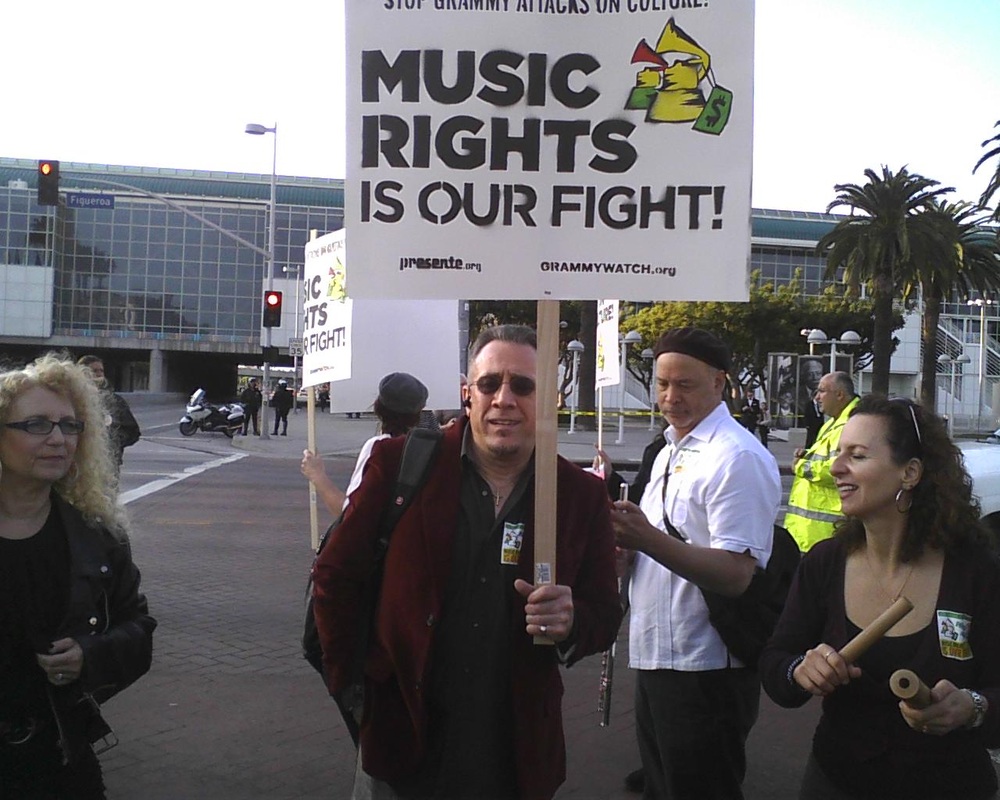
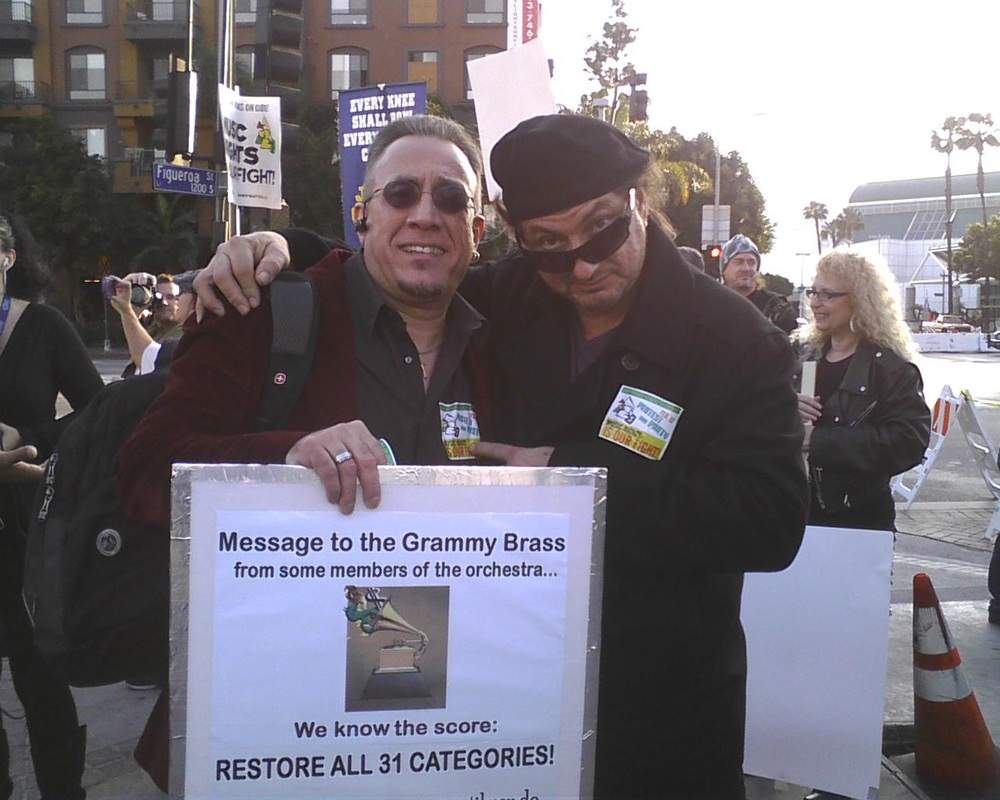
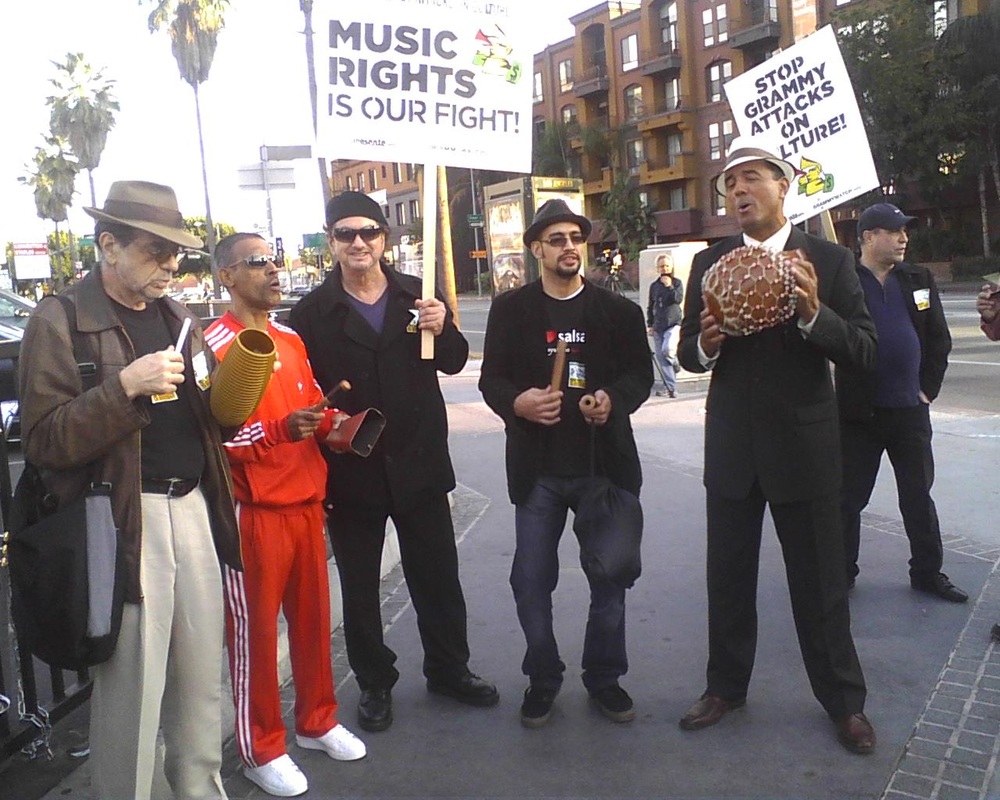

 RSS Feed
RSS Feed
